- Transformational Leadership Course
- Emotional Intelligence
- Train The Trainer
- Art of Decision Making
- Creativity & Innovation Workshop
- Time Management
- Interpersonal Skills
- Conflict Management Skills
- Negotiation Skills
- Decoding Facial Expressions and Body Language
- Effective Communication Skills
- Persuasive Presentation Skills
- iPEP (Inner Personality Enhancement Program)
- Design Thinking
Emotional Intelligence (2 Day Program)

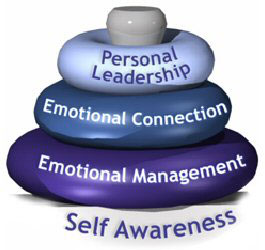
“In the last decade or so, science has discovered a tremendous amount about the role emotions play in our lives. Researchers have found that even more than IQ, your emotional awareness and abilities to handle feelings will determine your success and happiness in all walks of life, including family relationships.” – John Gottman
Emotional Intelligence is a way of recognizing, understanding, and choosing how we think, feel and act. It shapes our interactions with others and our understanding of ourselves. It defines how and what we learn; it allows us to set priorities; it determines the majority of our daily actions.
Emotional awareness means being able to recognize emotions that you experience, understand the feelings associated with the emotion, and understand what you think and do as a result.

Professional sportsmen and women get intensive training to help them recognize and overcome emotions during a game. It’s essential they don’t allow their performance to be affected by frustration or anger.
People are often told to control their emotions, to suppress feeling like anger, joy or fear and cut them off from the decision making process. This old paradigm suggests that emotions make us less effective; nothing could be farther from reality.
Emotional Intelligence training helps participants develop their emotional intelligence for greater success and fulfilment in workplace and life.
Train The Trainer (3 Day Program)
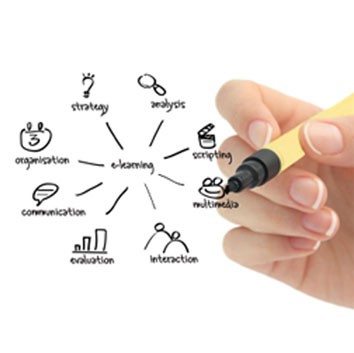
“A little boy brags to his sister that he taught his dog to whistle. When the sister hears nothing she quizzes him on his statement, only to be told ‘I said I taught him, I didn’t say he learned.’” – As illustrated by Piskurich
Why some trainer’s consistently create outstanding results while others struggle to communicate their ideas? Why is that some trainer’s lessons are understood and remembered and have a lasting impact while others strain even to hold the attention of their audience.
What is learning? Is it change in behaviour or understanding? Is it a process? An Engineering College professor spends an entire class explaining laws of thermodynamics and a week later only two students remember what it is.
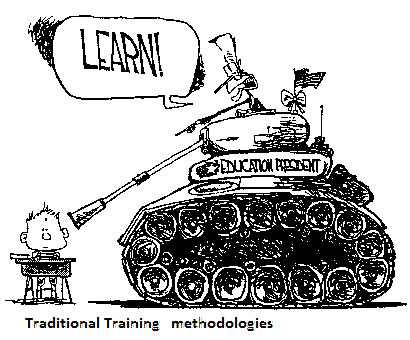
Why some trainers tick? What makes these trainers’ class so compelling? Why do some chemistry lessons work better than others? How People learn and change? How the mind absorbs information? How do we strip an idea down to its core? Interactive Seminars, role plays, discussions – do all these methodologies add value or do they end up ambiguous to the point of being meaningless?. Training is no easy task. It’s an art form; one that requires craft, creativity, mastery of specific skills and intelligence. Like any other professional activity, training requires cultivated ability. Train the Trainer is a course unlike any we’ve crafted before—specifically because of how thoroughly it immerses the participants in the experience of being a Trainer.
By the conclusion of the final session, participants will have an amazing reservoir of skills to draw on in their own training. Most important, participants will have found a source of guidance and inspiration that will last their entire career.
Art of Decision Making (1 Day Program)
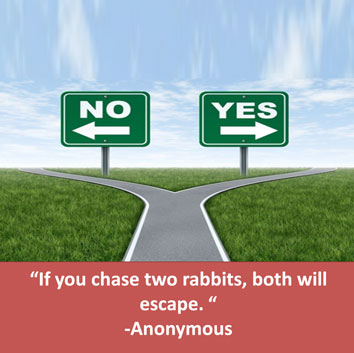

“Decision Making is one of the most essential skills that a leader must possess. In this program we will look at how leaders can improve their ability to make high stake decisions in organizations.
Why did that leader make such a horrible decision? We have all asked that question when we have observed a poor decision, whether it be in politics, business, athletics, or the non profit sector. Too often, observers attribute such flawed choices to incompetence, inexperience, a lack of intelligence, or bad intentions. In most cases, though, the faulty decisions do not arise because of these factors.
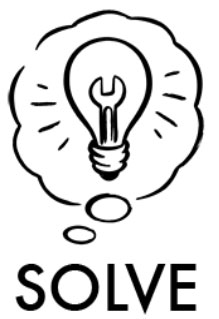
In this training program, we examine why leaders and organizations make poor choices, digging deep into cognitive psychology, group dynamics, and theories of organizational culture and systems to help us understand why well –intentioned, capable people blunder.
Moreover, we examine the techniques and behaviours that leaders can employ to improve decision making in their organization. We focus on how leaders can design decision making processes that take into account the collective intellect in their organizations, bringing together the diverse expertise, perspectives, and talents to determine the best course
Creativity & Innovation Workshop (2 Day Program)
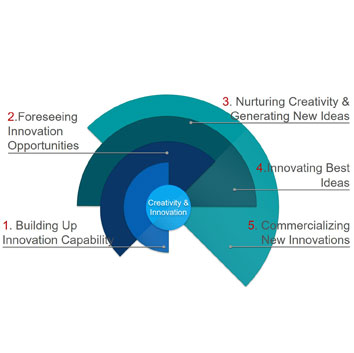
“Without creativity, there would be no progress, and we would be forever repeating the same patterns. “ -Edward de Bono
With exceptions, most managers do not stifle creativity on purpose. Yet in the pursuit of productivity, efficiency and control they often undermine it. A recent IBM poll of 1500 CEO’s says creativity is the number one ‘Leadership Competency’ of the future. Organizations led by creative leaders have a higher success rate in innovation, employee engagement, change and renewal.
Creativity & Innovation Framework:
John F Kennedy said, “Change is the law of life and those who look only to the past or present are certain to miss the future”. To survive, to change, to prosper, to excel and to create a better future, Innovation is the key.
Innovation is the ability to convert ideas into invoices. In other words Innovation is Idea + Execution.
A new idea is delicate. It can be killed by a sneer or a yawn; it can be stabbed to death by a quip or a frown on the right man’s brow. Turning an idea to a product or service with commercial value takes some nurturing.
Creativity and Innovation workshop equips participants with necessary knowledge, Skills and Attitude to succeed and excel as Innovators.
Time Management ( 1 Day Program)
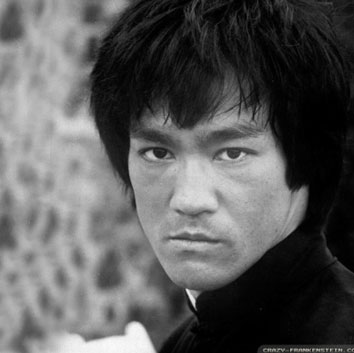

“We all have time to either spend or waste and it is our decision what to do with it. But once passed, it is gone forever. “-Bruce Lee
Every Individual on earth has the same amount of time – 60 seconds in a minute; 60 minutes in an hour; 1,440 minutes in a day; and 525,600 minutes in a year. While a vast majority of people confesses faltering to come to grips with it, extremely few can claim to have made the most of it. How is it that they have got it all done? It’s because they have managed a way to figure out how to manage their time effectively. Time management is more than just managing time. It is about controlling the use of the most valuable and undervalued resource. It is managing oneself in relation to time. It is setting priorities and taking charge of the situation and time utilization. It means changing those habits or activities that cause waste of time. It is being willing to adopt habits and methods to make maximum use of time.
Key points covered :
- Self Discipline and Self Motivation
- Clarifying objectives.
- Goal Setting and Prioritizing
- Keep things in perspective
- Spend less time putting out fires each day.
- Manage resources more efficiently
- Self Management & Self Direction
- Overcoming Procrastination & distraction
- Execution Skills and the Art of Getting things done
Interpersonal Skills (Two Day Program)


I will pay more for the ability to deal with people than for any other ability under the sun. – John Rockefeller. (Industrialist)
No matter how hard you work or how many brilliant ideas you may have, if you can’t connect with people who work around you, your professional life will suffer. The good news is that there are several concrete things that you can do to improve your social skills and become closer to your colleagues.
The program delves on attitudinal barriers, showing how these “roadblocks” damage relationships by increasing defensiveness, aggressiveness, or dependency. The program helps the participants to acquire the ability to listen, assert oneself, resolve conflicts, and work out problems with others.
Key points covered :
- Working harmoniously with others.
- Evaluate and accept responsibilities.
- Identify methods you use to respond to conflict
- Work in teams more efficiently
- Developing assertive approaches.
- Listening Skills & Power of Synergy
Conflict Management Skills (2 Day Program)
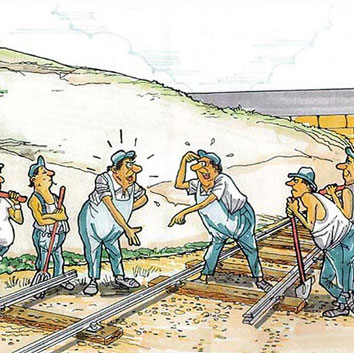
I will pay more for the ability to deal with people than for any other ability under the sun. – – John Rockefeller. (Industrialist)
Working together in a spirit of comradeship is a fundamental principle at work throughout the natural world. Redwood trees inter mingle their roots to stand strong against the wind and grow the incredible heights. Green algae and fungus unite and thrive on bare rock where nothing else will grow.
A musical chord is made up of several notes played at once. The notes do not lose their individual character, but together they create a concord – that single notes cannot produce. Like musical notes, people working in teams do not lose their identity; they combine their strengths with the strengths of others to produce a result far greater than anything either could achieve alone. Teams working in sync are the key to quantum leaps in productivity. It’s the driving mental force behind all genuine creativity.
The program helps participants to reach beneath the surface and discover what is alive and vital within us, and how all of our actions are based on human needs that we are seeking to meet. The program guides the participants to reframe how they express themselves and hear others.

Negotiation Skills (1 Day Program)
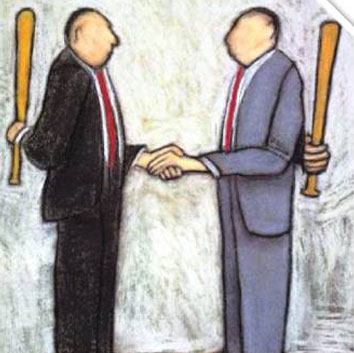
Everyone negotiates something every day.. A person negotiates with his spouse about where to go for dinner and with his child about when the lights go out. Negotiation is a basic means of getting what you want from others. It is back-and-forth communication designed to reach an agreement when you and the other side have some interests that are shared and others that are opposed.
Although negotiation takes place every day, it is not easy to do well. Standard strategies for negotiation often leave people dissatisfied, worn out, or alienated — and frequently all three.
People find themselves in a dilemma. They see two ways to negotiate: soft or hard. The soft negotiator wants to avoid personal conflict and so makes concessions readily in order to reach agreement. He wants an amicable resolution; yet he often ends up exploited and feeling bitter.
The hard negotiator sees any situation as a contest of wills in which the side that takes the more extreme positions and holds out longer fares better. He wants to win; yet he often ends up producing an equally hard response which exhausts him and his resources and harms his relationship with the other side. Other standard negotiating strategies fall between hard and soft, but each involves an attempted trade-off between getting what you want and getting along with people.
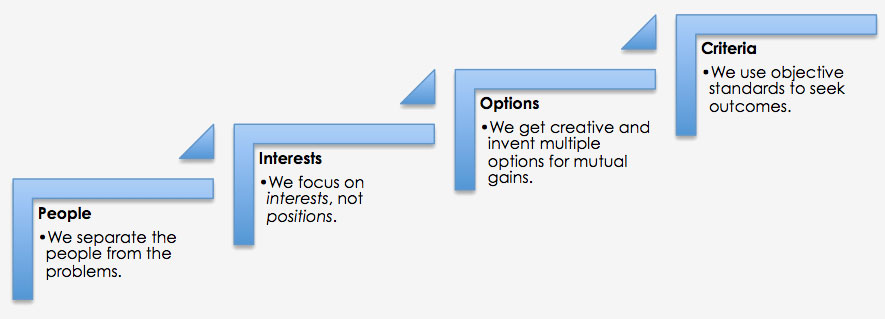
here is a third way to negotiate, a way neither hard nor soft, but rather both hard and soft. The method of principled negotiation. It suggests that you look for mutual gains wherever possible, and that where your interests conflict, you should insist that the result be based on some fair standards independent of the will of either side.
negotiation is hard on the merits, soft on the people. It employs no tricks ‘ and no posturing. Principled negotiation shows you how to obtain what you are entitled to and still be decent. It enables you to be fair while protecting you against those who would take advantage of your fairness. The program helps participants develop skills to successfully negotiate and conclude contracts or business deals in a efficient and fair approach.
Decoding Facial Expressions and Body Language (1 Day Program)

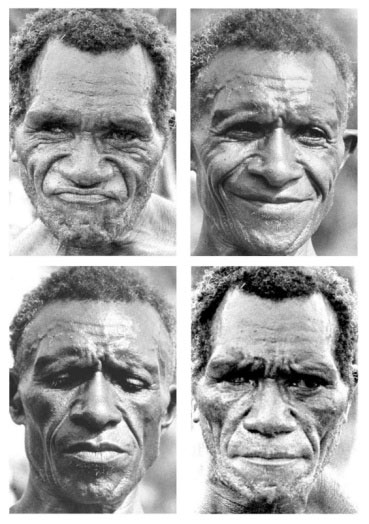
One Day Training Program to enhance ability to read subtle facial expressions, non-verbal behaviour and body language
What’s in a face?
Grand challenges like space exploration and weather prediction are expanding human frontiers, but the grandest challenge is the exploration of how we as human beings react to the world and interact with each other. What’s the role of facial expression in interpersonal communication?
Faces are “windows” that reveals a person’s inner world and social life. We have countless expressions to reflect our intuitive understanding of the face: “There was something in his eyes”, “Her lip curled up mockingly,” “Her eyes crinkled in amusement.” “Her cheeks reddened with shame.” His nostrils flared menacingly” The habitual way a person presents himself tells us if he is moody, aggressive, timid, compassionate, or jolly by nature. And then, to add another layer, what you are seeing may be an actual mask, concealing vulnerable inner state.
For example, a perpetually scowling person may be projecting anger in order to disguise fear or deep grief. We have spent too many hundreds of years blind to what is right under our noses, and above our noses for that matter. Reading people successfully – learning, decoding, and utilizing non verbal behaviour to predict human actions – is a task well worth your attention, one that offers ample rewards for the effort expended.
Effective Communication Skills (2 Day Program)
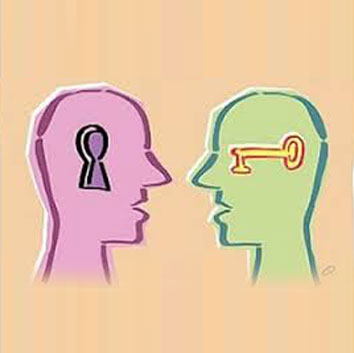
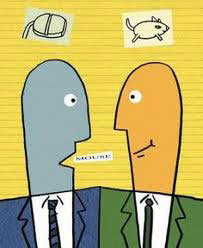
One of the biggest mistakes we make each day at work and in our homes is to underestimate the power of communication. Poor Communication costs money.Available research indicates that as much as 70% of all communication fails to achieve their purpose.
We are communicating all the time – whether we want it or not. Even when we choose to sit absolutely still, we are still communicating. Hence communication must never be looked in pieces. Words, gestures, tone of our voice – in fact our entire body communicates.
Yet most Communication training programs looks only on one or few aspects of communication and not at the bigger picture.The program helps participants enhance greatly, their ability to produce result by communicating effectively.
Key point Covered:
- Dealing with Assumptions
- Measuring the effectiveness of Communication
- Purging incongruence between words and actions
- Why listening is a powerful tool
- Communicate with Clarity, Poise and Confidence
- Voice, Choice of words & Body Language
Persuasive Presentation Skills (2 Day Program)
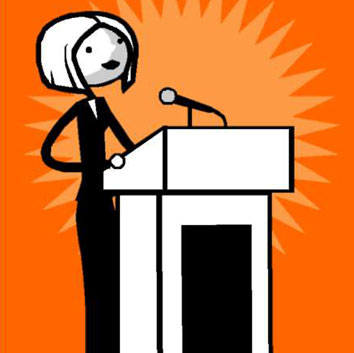
Presentations are ideas, concepts or issues that are talked about or shared with a group of people or an audience. It is immaterial whether the group size is small or large. What is important is that the presenter is able to capture and hold the attention of the audience.
Presentations are developed with the explicit purpose of conveying a message to an audience. The mode can be formal or informal, the audience internal or external, and the medium dependent on the availability of the equipment or devices at the venue.
All presentations are geared towards the audience. If the audience is able to sense value in the presentation, full credit is given but if it unable to identify any merit in the talk, the presenter and structure of the presentation is shunned.
Merely loading the audience with content does not lead to success in the presentation. The content has to be structured and formulated according to the needs, the expectations and the educational level of the audience. For example, a presentation to students on ‘stress management’ is going to very different from one made to corporate employees.
The program helps the participants design, develop and deliver high impact presentation confidently, with clarity and poise.
iPEP (Inner Personality Enhancement Program) 3 Days Program
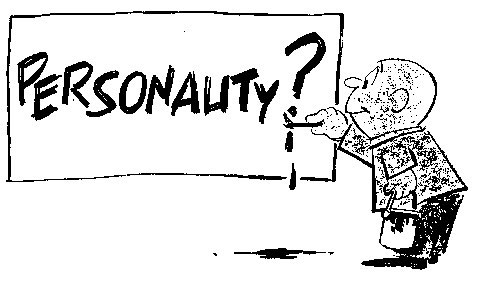
“If we all did the things we are capable of doing, we would literally astound ourselves.”– Thomas Alva Edison
Of all the judgments that we pass in life, none is as important as the one we pass on ourselves, for that judgment touches the very centre of our existence.
We interact with colleagues, with our boss, with clients at work, with family members at home… but when we are alone with ourselves..when we ponder over what relationship is the most crucial…the most intimate…the answer is quite obvious: the relationship that we have with ourselves. Every aspect of our lives is affected by what we think of ourselves. Throughout the day we question, assess, evaluate ourselves.
The program helps participants to dig deep within themselves and discover their dormant potential, and develop self confidence and self esteem. The Program has the potential to transform the core of a person.
Design Thinking (2 Day Program)
Over the past decade, “design thinking” has grown to become the leading approach to design. Whether being used to design businesses, products or services, design thinking has swept through nearly all industries. Design-thinking can often lead to innovative solutions that may revolutionize a business or even entire industries (think of Apple in computing). Design-thinking achieves these results by putting customers at the centre of a multi-disciplinary structured design process.

Design thinking is a human centered mindset and problem solving methodology that can be applied within and beyond the design function in any business, industry or profession to address complex problems and achieve remarkable results. Design thinking draws on both intuitive and rational thinking in equal measure. It always keeps people – their needs, their feelings, and their capabilities – at the center of the process.
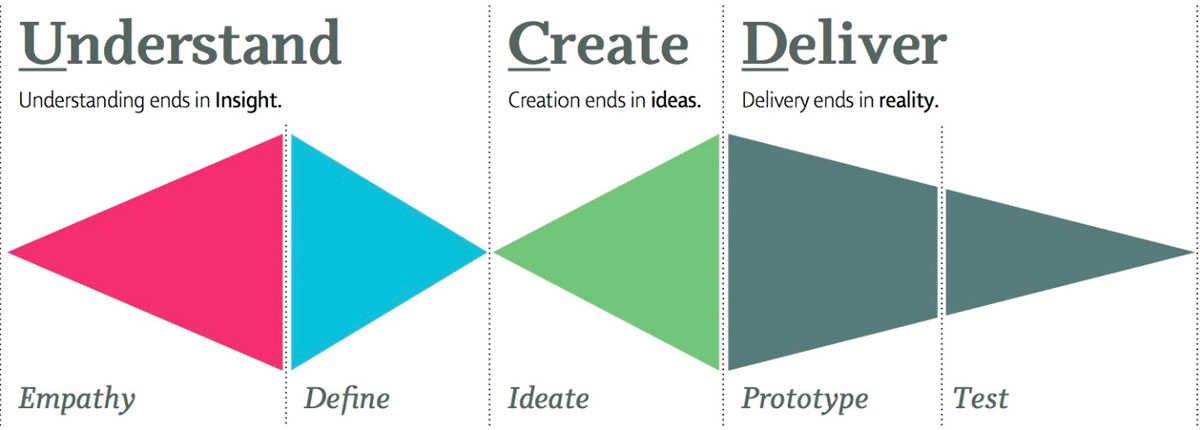
In this two day workshop, participants will learn what design thinking is and will get trained to practice design thinking in day to day life to solve problems, improve customer experience, develop new products or services and most importantly creating a culture of openness and innovation. This program will deliver valuable insights from ground up.





